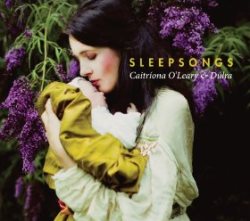| 
|
Sleep Songs
1. Cuirfidh mé féin mo Leanbh a Chodladh (I will Put my Baby to Sleep) [4:17]
2. Agus Seoithín (And Lulla, Lullaby) [1:07]
3. An Seóthó (The Lulla) [4:01]
4. Seobá mo Leanbh (Shush, my Baby) [1:33]
5. Uiseó (Hush o) [4:34]
6. Codail, a Leanbh (Sleep, Child) [1:19]
7. Rachaidh Sé (He will Go) [1:07]
8. Cosa Buí Árda (Little Yellow Legs) [2:05]
9. Ar Mhullach an tSídhe (On the Fairy Mound) [3:51]
10. Tá Mé ‘mo Chodladh (I Am Asleep) [3:43]
11. Codail Beagán (Sleep a Little) – by C. O’Leary [3:53]
12. Seoithín mo Leanbh (Lullaby my Baby) [1:56]
13. Suantraí Nua Eabhrac (New York Lullaby) – by C. O’Leary [1:41]
14. Lollai Littl Child – C. O’Leary [2:15]
15. When I Was Young [2:15]
16. Cucú-ín (Little Cuckoo) [3:40]
17. A Bhean úd Thíos ar Bhruach an tSrutháin (O Woman Beside the Stream) [6:40]
Caitríona O’Leary (voice)
Dúlra (Adrian Hart (fiddle),Emer Mayock (flute & whistle), Kate Ellis (cello), Mel Mercier (bodhrán))
Deirdre O’Leary (B flat and bass clarinets), Erin Headley (bass viol and lirone) Francesco Turrisi (percussion)
University College Cork Gamelan/Mel Mercier
rec. Jan. 2011, St. Peter’s Church of Ireland, Drogheda, Ireland.
HERESY 014 [50:08]
A succession of seventeen lullabies accompanied on Irish traditional instruments may not sound like the most stimulating prospect. Suspend your disbelief for a moment, because this is a very lovely album in every sense.
Quite apart from the musical qualities, enormous care and imagination has gone into the presentation of the project. It comes in the form of a small hard-back book, the CD slipped inside the rear cover. The contents are illustrated with rather dramatic photographs, the texts clearly printed in Irish and English, the margins decorated with border patterns in the style of William Morris (indeed they may actually be William Morris, though the booklet doesn’t say).
Beautifully produced then, and the same description can be applied to the music. Caitríona O’Leary here creatively explores ancient forms of Irish music, though she emphasises that she has been singing some of these songs for many years. Song plays a vital part in Irish culture – the Irish still use the phrase ‘abair amhráin’ meaning ‘to speak a song’ – indicating the close and overlapping nature of music and poetry. The music of a song can have a magical quality; it can be a spell simply to lull a child to sleep, or to ward off evil spirits who are often lurking nearby. In her notes, O’Leary makes the point that “Irish fairies are not like Disney’s Tinkerbell! They are mansize and menacing!” Most of the songs are in the Irish language, but track 14 contains Lollai litil child, from the so-called Kildare Poems of around 1330.
So - are seventeen lullabies pleasantly relaxing or just plain boring? In this case, very much the former, I’m glad to say. Although there is a prevailing mood of enjoyable drowsiness, there is also great variety, partly because O’Leary’s fey vocal tones are offset by a rich instrumental palette. Some numbers are for unaccompanied voice, some have just one or two instruments, while others are purely instrumental, like the deeply expressive viol solo of track 6. There are some tracks that start as songs then flow into instrumental dances, such as the infectious little jig that follows the ‘dandling song’ (as O’Leary describes it) of track 8.
The haunting folk instrumentals of O’Leary’s ensemble Dúlra, Adrian Hart’s fiddle especially evocative and stylish, are then supplemented on certain tracks; the clarinet of Deirdre O’Leary (sister?) burbles quietly on track 1. Her bass clarinet gives an unmistakably doleful touch to track 13, entitled New York Lullaby, an original melody evoking the time O’Leary spent in the heat of that city. The addition of the University of Cork Gamelan for the final track adds a wonderful new dimension of fluid beauty. It’s the first time I have heard an actual gamelan used in this way in Western music. I’m sure there are other examples.
The varying moods and characters of the pieces here reflect Caitríona O’Leary’s research into three characteristics of old Irish music and poetry, namely Goltraí, Geantraí and Suantraí, which correspond approximately to songs or dances that are lamenting, joyful or lulling in nature. All in all, what we are given is not only a very special musical experience, but also a valuable and lovingly produced document. It brings to life, magically, something that is a million miles from the alcohol-fuelled rubbish you’ll too often hear churned out in so-called ‘Irish pubs’ around the world. Here are the unique ancient riches of Irish music.
Gwyn Parry-Jones
 |
 |
|











